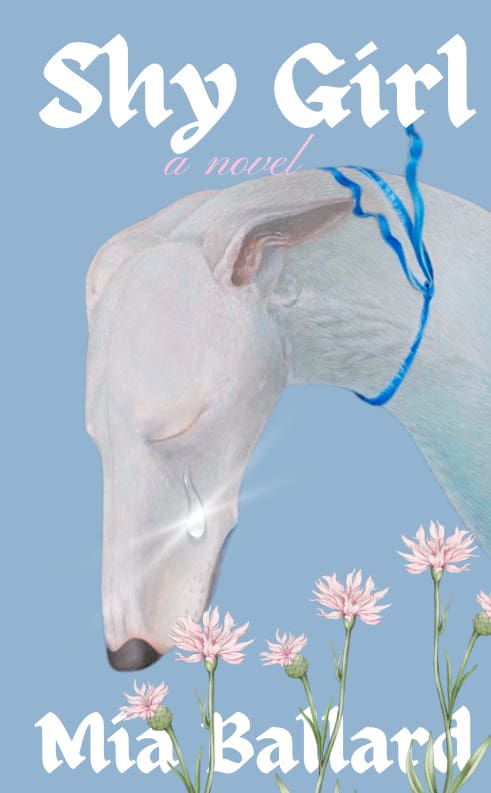
Synopsis:
Lonely, broke and depressed with a serious case of OCD, Gia finds herself at a crossroads when her financial troubles lead her to Nathan, a mysterious and affluent man she encounters on a sugar daddy website. Desperate for a solution, Gia is intrigued by Nathan’s unconventional offer: in exchange for living as his devoted pet, all her debts will be erased. But the longer Gia is in captivity, the more animalistic she becomes.
Review:
Well that was a ride! Corrosive but addictive, “Shy Girl,” by Mia Ballard hits the senses the same way that acetone does. It will burn through your sinuses and leave you lightheaded. It’s a book that seeps into your pores, sticks under your nails and makes you feel like you need a long, scalding shower afterwards. Deceptively unassuming cover, and slightly furry premise aside, “Shy Girl,” is a book about degradation, and transgression, it’s about circumstance and consequence, it’s about captivity, and then freedom. Ultimately though it’s an unfiltered and full-throttle expression of female rage. One of the more extreme novels I’ve read this year so far, Ballard gleefully oversteps every boundary in sight, writing passages that made me squirm- never mind polite society. At points, I was horrified, and my disgust from the 80% mark onward was permanent, and yet despite (or maybe because of) its grotesqueries- I loved it.
Gia is unemployed and about to be evicted from her apartment. No matter how many jobs she applies for, she just can’t seem to find anything, and in a last ditch effort to pay rent for the month, she signs up for a sugar daddy dating website. She meets Nathan. Nathan is charming, and not that old, and most importantly wealthy. They go on a couple of dates and everything seems normal, until she goes back to his house. There is a cage, a large one, and no sign of a dog. It slowly but surely, and painfully, becomes apparent that Gia is to act as his pet. She leaves, horrified, but the seed is planted. Then she receives another passive aggressive note from her landlord. $2400 a week is no small sum. Stability, security, survival. It’s with this in mind that Gia does something that may have once been unthinkable, she picks up the phone, and tells Nathan “I’m in.”
I haven’t read either of Ballard’s other works “Sugar,” or “We All Rot Eventually,” but I’m certainly going to. I was not surprised to learn that she dabbles in poetry though. Her writing is reminiscent of Eric Larocca’s, and I’d very much like to read more of it. It’s rich and raw and lyrical and has a butter-like quality. It’s a fascinating juxtaposition that works really well in horror: where the plot is rough and bumpy and abrasive, Ballard’s writing is soft and velvety- although not quite plush enough to protect us from the gut-punch after gut-punch she delivers.
The dark, pulsating heart of “Shy Girl,” beats with a potent and visceral anger. This is horror at its most unflinching, not just in its grotesque imagery or taboo premise, but in its emotional violence. Lots of graphic, explicit things happen in this book, (again, check your trigger warnings) but the scariest element for me was the slow, excruciating process of Gia being stripped of her autonomy, reduced to something sub-human, and essentially forced to either submit or snap: you may be pleased to know, it’s the latter. It’s a story of survival, and it recognises that sometimes… survival means transformation, and sometimes… transformation means destruction. Shy Girl’s brand of horror, whilst outrageous and taboo, is also resonant. Nathan is essentially an extreme embodiment of the expectations placed upon women. To be passive, to endure, to adapt. It’s just that that makes the final act of the novel pure catharsis. It is both deeply uncomfortable and deeply satisfying, because “Shy Girl,” understands that sometimes justice is retributive, sometimes it is bloody and messy and necessary.
“Shy Girl,” is a story that envelops it’s reader. It’s an uncomfortable, challenging, and unpleasant -but also freeing- book that could very well finish any elderly relatives you don’t like off. It’s a book that won’t be for everyone, and it doesn’t try to be, because it’s also a book that very much has its audience. If you like your reading, rageful and your literature, liberating, and you also happen to have both a stomach and sensibilities of steel, I dare you.









Leave a Reply